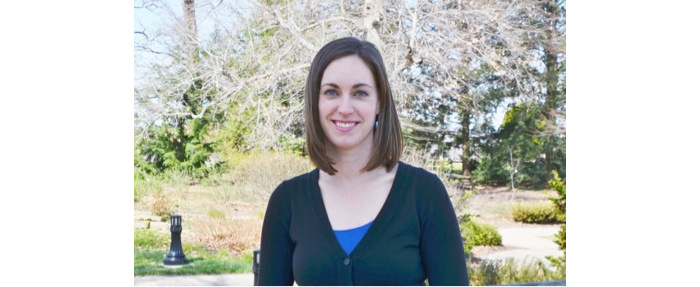Sarah Mill is the Director of Education at the Dawes Arboretum in Newark, Ohio. It’s a multi-faceted job that requires her to wear many different hats. She manages all programming that the arboretum does. That’s anything from school programs, summer day programs, youth programs, as well as workshops, lectures, and classes for the general public.
The Denison Environmental Studies department, she says, helped prepare her for the dynamic nature of her work.
“I work with staff internally in their areas of expertise in order to develop and offer programs. And then I also network and collaborate with outside experts in order to come in as guests and support our programs,” Mill said.
“One of the things that Denison really lent me was the ability to have a interdisciplinary major, and to investigate a lot of different avenues, a lot of career opportunities within the environmental field. From working with environmental policy, to working with environmental education or hard science—I really got to test the waters with all of those different things.”
Mill declared a self-designated concentration in Environmental Management within the ENVS major. That concentration included coursework in Geographical Information Systems, conservation biology, and environmental geology.
“A lot of what I learned lent itself to success in my first job as an environmental scientist,” Mill said.
Prior to working at the Arboretum, Mill worked as an Environmental Scientist for PANDEY Environmental, LLC, an environmental consulting and engineering firm. There, she helped conduct field property assessments, drafted technical reports, maps and granted applications, as well as supervising remediation, sampling and drilling operations in the field. The work was largely focused on site remediation.
Though Sarah appreciated the opportunity to work hands-on in hard science, she eventually found her calling to be program development.
Mill worked as an Environmental Education Specialist for Girl Scouts of Ohio’s Heartland for seven years. There, she managed an Environmental Education Center, which helped to coordinate efforts to introduce scouts to environmental stewardship through programming in natural science and recreation. The job gave another nod to her Denison years—she had worked with Girl Scouts each of the summers that she was in school.
When Mill was a student, she was a fellow in the department and assisted professors with their research, as well as conducted senior research of her own, and a side independent research project, an opportunity that she says helped her with networking skills and developing the ability to work on a wide range of projects.
Even her work today has ties to her Denison education. Sarah worked with Dawes Arboretum as a volunteer when she was a student.
“I had made a point of engaging with some of the staff here and it gave me an opportunity to stay well networked with them. That’s actually how I learned about the opening that I currently filled here. It was really just based on the relationships that I built upon as a volunteer, and then stay in touch as a volunteer to those individuals for several years,” Mill said.
When asked if she has any advice for current Denison Environmental Studies students, Mill says that networking is huge.
“Any opportunity that students have to volunteer, to sit on boards and committees with local organizations, to participate in internships, I think those skills are hugely valuable in breaking into a career. I find that I still am in touch with many of the individuals that I built relationships with while I was at Denison.”
Finally, perhaps the biggest benefit that Mills says she got from Denison was her ability to help make a difference on the environmental issue she is most passionate about: environmental literacy. Looking towards the future, Mill says she wants to promote literacy among children within her community in central Ohio.
“I don’t believe that people will care about things that they don’t see value in, so I think that piquing peoples curiosity and interest, especially children, helps to encourage them to develop a love and appreciation for nature and the outdoors. That’s something that I’d love to find a way to get creative with that in my own life and my own community to help encourage that,” Mill said.
